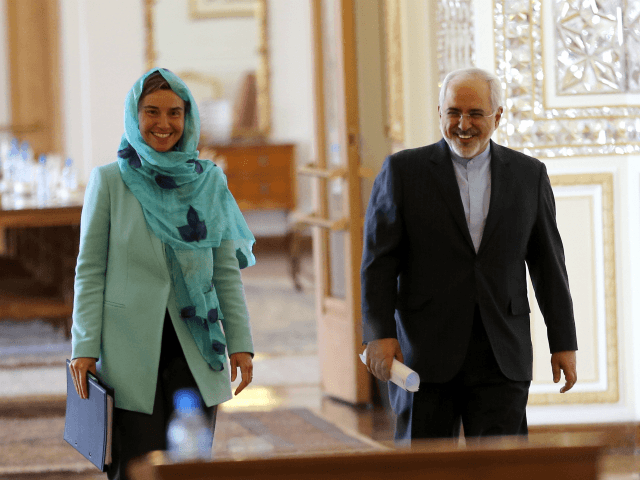Iran’s oil export industry and financial institutions are bracing for turmoil while applauding European Union support ahead of new U.S. trade sanctions that begin Monday.
The restrictions come six months after President Donald Trump fulfilled a campaign promise and ended an Obama-era nuclear agreement with the Middle East state.
While the European Union (E.U.) has sought to preserve the flawed trade agreement with Iran by negotiating backdoor methods of trade, most major companies have chosen to exit the country. These include French energy giant Total and carmakers Peugeot and Renault as well as Germany’s Siemens and Daimler.
Iran and the E.U. announced their defiance towards U.S. President Donald Trump’s administration after high-level talks at the United Nations in September. E.U. foreign policy chief Federica Mogherini delivered her plan for continued bi-lateral trade while standing alongside Iranian Foreign Minister Mohammad Javad Zarif.
The coaliton forming between the E.U. and Iran was met with disbelief and anger from U.S. Secretary of State Mike Pompeo.
John Bolton, President Trump’s national security adviser, also mocked the E.U. for being light on detail for how its evasion mechanisms will work.
“The European Union is strong on rhetoric and weak on follow-through,” he told the United Against a Nuclear Iran campaign. “We do not intend to allow our sanctions to be evaded by Europe or anybody else.”
Bolton also issued unsubtle warnings to Iran’s leaders: “We are watching, and we will come after you.”
“If you cross us, our allies or our partners, if you harm our citizens, if you continue to lie, cheat and deceive, there will be hell to pay.”
U.S. Arab allies Saudi Arabia and the United Arab Emirates as well as Israel have long sought for Washington to work to curtail non-Arab and predominantly Shiite Muslim Iran’s influence in the Middle East, including in war-torn Syria.
They applauded when the first sanctions came into force on August 7, banning:
– The Iranian government’s purchases of dollars, or the international buying and selling of significant sums of rials, Iran’s under-pressure currency
– Purchases of Iranian treasury bonds
– Trade in gold or other precious metals, aluminum, steel, carbon or graphite
– Automobile and commercial aviation trade
– US imports of Iranian carpets or foodstuffs
Despite Mr. Trump fulfilling a campaign promise by re-imposing the sanctions, some Obama-era officials including former Secretary of State John Kerry have been caught working behind the scene to help the E.U. continue their trade.
I have been told by banking officials in Europe that former senior Obama officials worked with European officials to design sanctions evasion schemes. This effort was likely closely coordinated with the Islamic Republic. Hard to imagine Kerry didn’t discuss these efforts as well. https://t.co/jzMgZ9avbS
— Richard Goldberg (@rich_goldberg) September 16, 2018
Meanwhile, the toughest of the Obama-era sanctions lifted under the 2015 nuclear deal will come back on Monday, including bans on:
– Energy sector sales including oil. The Trump administration says it aims for Iranian oil exports to be “as close to zero as possible” but the United States will likely give at least temporary reprieves to countries that cut but do not end purchases.
Iran will likely still export oil, its main commodity, in some form. Iran could mix its oil with crude from neighboring Iraq, sell on the black market or try a barter system supported by the E.U.
– Financial transactions. Starting on Monday, any foreign institution that does business with Iran’s central bank or other banks in the country will lose access to the U.S. financial system. The risks for foreign banks are high in a globalized economy in which the dollar remains the dominant currency.
One unresolved issue is whether the United States will press to disconnect Iranian banks from SWIFT, the international system of interbank transfers headed in Belgium.
Federica Mogherini believes that despite the new rollout of sanctions, trade between Europe and Iran will continue in defiance of Mr. Trump.
“In practical terms, this will mean that E.U. member states will set up a legal entity to facilitate legitimate financial transactions with Iran and this will allow European companies to continue to trade with Iran in accordance with European Union law and could be open to other partners in the world,” she told reporters.
She hopes all members of the so-called Joint Comprehensive Plan of Action — Britain, China, France, Germany and Russia — will maintain their commitments to support Iran as directed by the E.U. and Brussels.
AFP contibuted to this report
Follow Simon Kent on Twitter: Follow @SunSimonKent or e-mail to: skent@breitbart.com

COMMENTS
Please let us know if you're having issues with commenting.